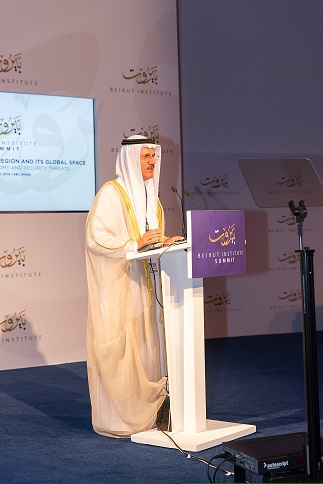 Al Faisal: “The Arab Region has incredible human, economic and natural resources”
Al Faisal: “The Arab Region has incredible human, economic and natural resources”
Al Mansouri: “We will only succeed by all working together and building on our advances in the past few decades”
Dergham: “This Summit serves as a platform for a new innovative, empowered generation to confront our detractors”
Held in Abu Dhabi this weekend, Beirut Institute Summit kicked off its proceedings on Saturday in the presence of 200 global leaders, including sitting and former presidents, prime ministers and ministers, and tier one global officials, dignitaries and senior public policy experts from the UAE, the Arab region, USA, Europe, Russia, China, South America and Africa.
During the opening ceremony, HRH Prince Turki Al Faisal Member of the Board of Beirut Institute and Co-Chair of Beirut Institute Summit, said that: “This summit is an important gathering which will propose viable solutions for a range of pressing problems and help us learn from our past mistakes for the benefit of the entire region.”
“The Arab Region has incredible human, economic and natural resources, but is overshadowed by the spectre of conflict and dispute: this summit will help us take on these challenges and correct misperceptions in a positive way”, HRH Prince Turki added.
H.E. Eng. Sultan Bin Saeed Al Mansouri, Minister of Economy of the United Arab Emirates pointed out in his address that the Arab Region “This is a remarkable gathering, giving us hope at a time of darkness in some areas of the region and ensuring we are pro-active in confronting our challenges. We will only succeed by all working together and building on our advances in the past few decades.”
The Minister added: “In the UAE, we have built a strong and resilient infrastructure to attract foreign direct investment, diversify the economy and build a dynamic, forward looking knowledge economy”
Highlighting the importance of this summit in her speech, Raghida Dergham, Founder and Executive Chairman of Beirut Institute, said: “Building on the strength of our region’s diverse make up, we will over the next two days be presenting a series of ideas and recommendations to decision makers as part of our contribution to the democratic decision making process.”
She added: “This Summit serves as a platform for a new innovative, empowered generation to confront our detractors.”Beirut Institute Summit started its activities earlier that day with four off-the-record Policy Circles involving more than 120 international and regional figures engaged in closed-door talks focusing on the reconfiguration of the Arab region and its global space beyond political economy and security threats. The Policy Circles were led by HRH Prince Turki
Al Faisal, Member of the Board of Beirut Institute and Co-Chair of Beirut Institute Summit, HE Dr. Amre Moussa, Former Secretary General of the League of Arab States, HE Dr. Barham Salih, Former Prime Minister of Iraqi Kurdistan and Former Deputy Prime Minister of Iraq, and HE Danilo Türk, Former President of the Republic of Slovenia.
Among those who attended the opening ceremony and the Policy Circles were HE Abdul Latif bin Rashid Al Zayani, Secretary-General of the Gulf Cooperation Council for the Arab States of the Gulf, HE Jan Eliasson, Deputy Secretary-General of the United Nations, HE Mohammed Dayri, Minister of Foreign Affairs and International Cooperation of Libya, HE Nohad El Machnouk, Minister of Interior and Municipalities in Lebanon, HE Fatou Bensouda, Chief Prosecutor of the International
Criminal Court, Dr. Philip Gordon, Former Assistant Secretary of State for European and Eurasian Affairs, and HE Kevin Rudd, Former Prime Minister of Australia.Beirut Institute Summit will run from October 10 and 11 and will explore the Arab region’s challenges and potential through integrated inter-disciplinary perspectives that move beyond a traditional understanding of the concepts of “political economy” and “security threats”. Among the issues under the spotlight at the open-door plenary sessions are the role of smart cities, Arab women’s viewpoints and the relationship between ideas and policy.

